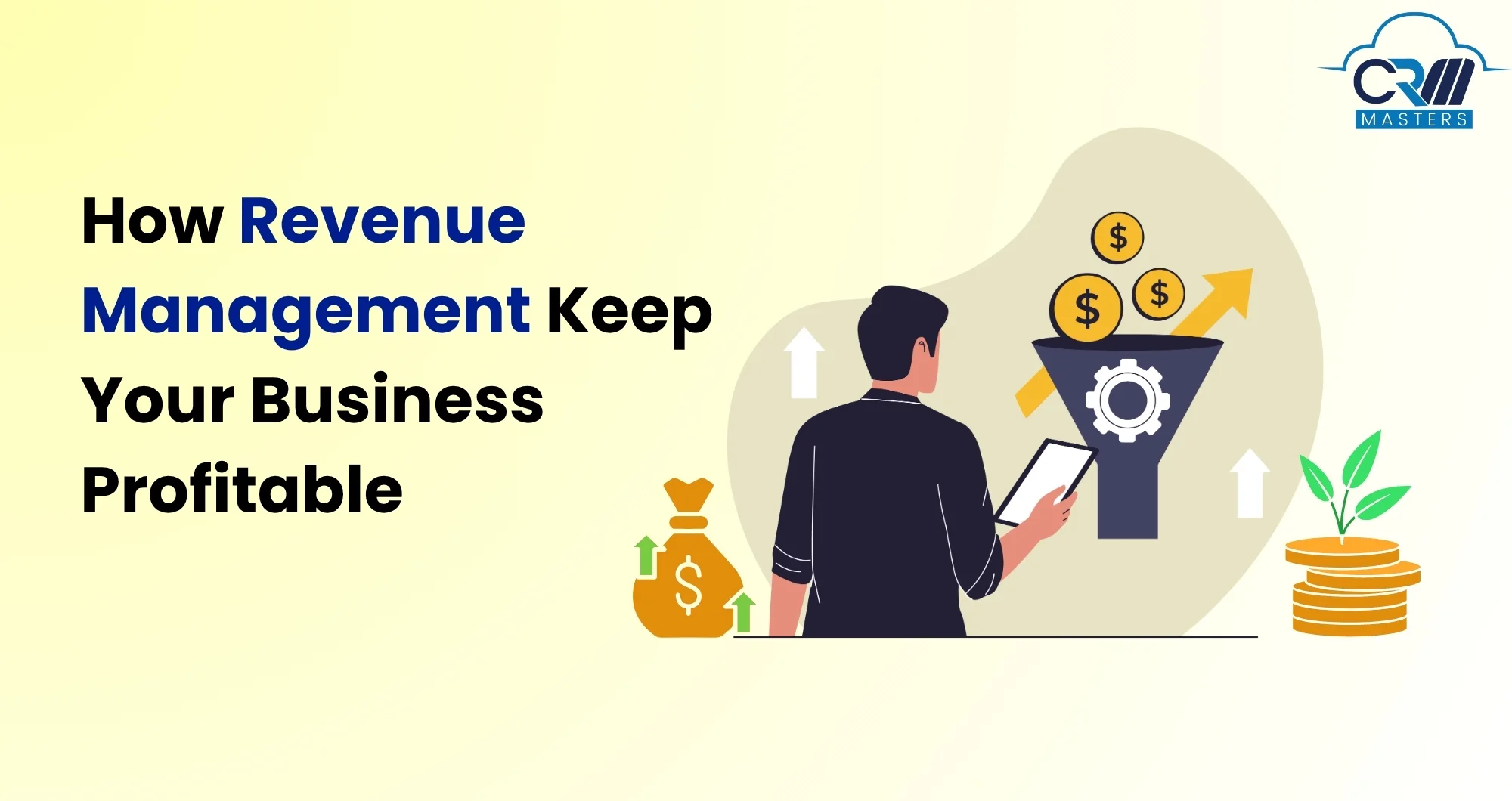
How Revenue Management Keep Your Business Profitable
Imagine you run a luxury resort with 100 rooms, or a manufacturing unit with fixed production capacity. Demand keeps changing, sometimes you’re booked out weeks in advance, other times your inventory just sits there. You can’t magically expand your supply overnight, but you can make every available unit count. This is where Revenue Management steps in, a strategic approach that ensures you’re selling the right product to the right customer at the right price and time. It’s how leading businesses turn limited supply and changing demand into consistent profit.
In this blog, let’s decode how revenue management works, why it’s crucial in 2025, and how you can use it to make smarter pricing and inventory decisions, no matter what industry you’re in.
What is Revenue Management?

At its core, Revenue Management is about using data to predict customer demand and adjusting pricing, inventory, and sales strategies to earn maximum revenue.
It’s not just about selling more, it’s about selling smarter. The idea is to align your available supply (be it rooms, raw materials, product stock, or service hours) with customer demand, in the most profitable way possible. Businesses that master this balance can easily adapt to market changes and stay profitable even when supply or demand fluctuates.
Think of it as a balance between:
- Demand forecasting: Predicting when and where customers will buy.
- Pricing strategy: Setting rates based on what customers are willing to pay.
- Inventory control: Ensuring the right amount of stock or service slots is available.
Why is Revenue Management Important for Business?

Nowadays business environment is unpredictable. Costs are rising, consumer expectations are shifting, and competition is fierce. For industries where supply is limited or cannot expand overnight, like airlines, hotels, or even manufacturing, efficient revenue management can be the difference between loss and growth.
When implemented well, revenue management becomes a powerful tool to increase profitability, without changing your existing supply.
Here’s why it matters now more than ever:
- Unstable demand: Seasonal trends and market events can cause unpredictable sales patterns.
- Limited resources: You can’t always increase production or expand capacity quickly.
- Dynamic pricing models: Customers are more price-sensitive and expect flexible rates.
- Data availability: Businesses have access to detailed analytics that can inform smarter decisions.
Core Principles of Effective Revenue Management

Every successful Revenue Management strategy rests on a few fundamental principles.
Here’s how to build a strong foundation:
1. Know Your Supply Inside Out
Start with understanding what you’re selling, the quantity, constraints, and variations in your offerings.
For example, if you run a hotel, you should know how room types, booking durations, and special packages affect availability. If you’re in manufacturing, identify your production limits, storage capacity, and raw material availability.
2. Know Your Customers
Revenue Management is customer-driven. Identify your ideal customer personas, who they are, what they value, and how much they are willing to pay. Segment them by behaviour, location, and preferences to create targeted pricing strategies.
3. Study Your Calendar
Demand rarely stays constant. Understand how seasons, holidays, or events influence your sales. For example, hotels see spikes during vacation months, while manufacturers face pressure before the festive seasons.
4. Monitor Your Market
Keep an eye on competitors. Compare pricing, product quality, and service levels. Knowing what your customers see when comparing you to others helps you position yourself strategically.
5. Learn from Past Performance
Your business history is a goldmine of insights. Study past trends, what worked, what didn’t, and how external factors affected performance. These insights help fine-tune future forecast and decisions.
Turning Data into Smarter Decisions
Revenue Management thrives on data not guesswork. Once you have all your data (inventory, customer, calendar, and market insights), the next step is to analyze it.
1. Segment Your Data
- Break down your data to find patterns:
- Which customer segments buy at premium prices?
- Which discounts or offers perform best?
- When do cancellations or low-demand periods occur most often?
2. Use Forecasting Tools
With today’s CRM and analytics platforms, forecasting isn’t limited to spreadsheets. You can use data visualization and AI-based insights to anticipate future demand and plan your pricing strategies accordingly.
3. Apply Insights to Strategy
Data should directly inform how you price your products, when you release discounts, and how you allocate stock. For example, if data shows higher booking rates during weekends, you might set higher weekend rates and promote weekday deals.
4. Setting the Right Price Every Time
One of the most powerful aspects of Revenue Management is dynamic pricing, adjusting prices based on demand, timing, and customer behavior. A smart pricing strategy doesn’t just maximize profit, it strengthens brand positioning. However, always ensure that your pricing feels fair and transparent to customers.
Here’s how businesses use it effectively:
High demand = premium pricing: Airlines and hotels often raise prices when seats or rooms are limited.
Low demand = discounts: Early-bird or off-season offers attract customers and maintain cash flow.
Bulk buying = custom rates: Manufacturers or SaaS providers can offer corporate discounts for volume purchases.
Segment-based pricing: Offer tiered prices for different customer groups based on value perception.
5. Adapting Revenue Management to Your Industry
Revenue Management isn’t limited to travel or hospitality. Every business with fluctuating demand or finite supply can benefit from this discipline.
Its principles can be adapted across industries:
- Manufacturing: Optimize production cycles, manage limited resources, and price based on material availability and order size.
- SaaS Companies: Use tier-based pricing, offer limited-time plans, and monitor user acquisition trends.
- Retail: Forecast product demand for seasonal goods and clear inventory at strategic times.
- Events & Services: Manage bookings, timing, and pricing to fill capacity efficiently.
7. Continuous Improvement
Revenue Management isn’t a one-time process. Market conditions, customer expectations, and competitor pricing all evolve.
That’s why the best businesses constantly:
- Review key metrics like revenue per unit, occupancy/utilization rate, and customer acquisition cost.
- A/B test pricing models to find the most profitable ones.
- Adjust forecasting models as new data emerges.
- Stay agile, ready to pivot when external conditions change.
Common Mistakes to Avoid in Revenue Management
While every business aims to optimize revenue, many unknowingly make mistakes that affect profitability and long-term growth. Understanding these pitfalls can help you build a stronger, more data-driven Revenue Management process. Let’s look at some common mistakes and how you can avoid them.
1. Relying on Manual Process
Managing revenue manually using spreadsheets or disconnected tools can lead to costly errors, delayed reporting, and missed insights. Businesses that still depend on manual calculations often struggle to keep up with fast-changing market dynamics.
Automate your revenue processes with Zoho, which offer real-time tracking, forecasting, and compliance management, all in one place.
2. Ignoring Data Accuracy
Revenue Management is only as effective as the data behind it. Inconsistent or inaccurate data can result in wrong forecasts, billing errors, and poor decision-making.
Maintain clean, centralized data by integrating your accounting, CRM, and subscription systems. This ensures your numbers are always reliable and up-to-date.
3. Overlooking Revenue Leakage
Small errors like unbilled services, incorrect pricing, or missed renewals can cause silent revenue leakage over time. Businesses often don’t realize how much profit slips through the cracks until they audit their financials.
Use automated reconciliation and billing validation systems to catch discrepancies early. Zoho built-in audit trails can help you identify and prevent such losses efficiently.
4. Lack of Cross-Department Collaboration
Revenue management isn’t just a finance team’s responsibility, it involves sales, operations, and customer support too. Miscommunication between teams can delay invoicing, impact customer satisfaction, and create financial inconsistencies.
Encourage transparency and collaboration by adopting a unified platform like Zoho Finance Suite, where all departments can access shared revenue insights.
5. Neglecting Forecasting and Scenario Planning
Many companies focus only on current revenue without analyzing future projections or potential risks. This lack of foresight can lead to poor cash flow management.
Invest in AI-driven forecasting tools that provide accurate predictions based on historical and real-time data. With Zoho’s intelligent analytics, you can model different revenue scenarios and make smarter financial decisions.
Making Every Opportunity Count with CRM Masters
Revenue management is about strategy, not chance. It allows businesses to make informed decisions based on facts, not assumptions, and turn limited resources into higher returns.
Whether you’re managing hotel rooms, manufacturing orders, or SaaS subscriptions, applying revenue management ensures you’re ready for every demand shift, every market change, and every opportunity to grow.
So, instead of simply selling more, focus on selling smarter because every product, seat, or service hour can be your next opportunity for profit.
We at CRM Masters have over 9+ years of experience as Zoho Partner helping businesses get the best Zoho Solutions.
Book your free consultation call now!
FAQ
Q1. What is the main goal of revenue management?
Ans. To maximize revenue by aligning pricing, demand, and inventory efficiently ensuring every available unit contributes to profit.
Q2. Which industries can benefit from revenue management?
Ans. Hotels, airlines, manufacturing, SaaS, retail, and event-based businesses, basically, any business with limited supply or fluctuating demand.
Q3. How does technology support revenue management?
Ans. Modern CRMs and analytics tools provide real-time data and forecasts that help businesses set the right prices, predict demand, and manage inventory dynamically.
Q4. What’s the difference between Revenue Management and pricing strategy?
Ans. Pricing is just one part of revenue management. Revenue management also involves forecasting, segmentation, and inventory optimization.












